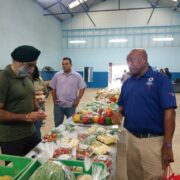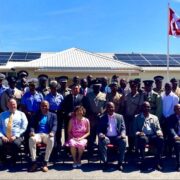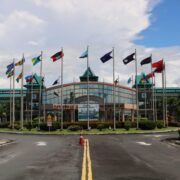Food security in Statia at heart of multi-million euro agreement signed with European Union
Black Immigrant Daily News
With climate change and global conflicts such as the war in Ukraine leaving small states like Statia at risk of major food shortages, the Government of St. Eustatius, with support from the European Union (EU), has taken a major step towards sustainable agriculture on the island.
The two sides have signed a EUR2.9 million sustainable agriculture agreement to ensure basic food security, create economic opportunities and increase Statia’s resilience against external threats such as extreme weather exacerbated by climate change.
The financial agreement for Sint Eustatius signed on 26 January 2023 by Government Commissioner Alida Francis in the presence of European Union Ambassador Rene van Nes and EU Delegation Programme Manager Kristina Sevastou, will also contribute to the sustainable management of the island’s natural resources, leading to a healthy natural environment and increased biodiversity. It will run for a four-year period, from 2023-2026.
“The United Nations World Food Programme estimates that nearly 350 million people face acute food insecurity worldwide due to climate change and global conflicts. As a small island with few resources, Statia is extremely vulnerable to these conditions,” said Ms. Francis. “Statians are currently feeling the impact of escalating food prices and the rise in the cost of living, which makes this agreement with the European Union even more necessary and vital for the future of our island and its residents.”
Ambassador Van Nes added: “The impact of climate change is worldwide. The European Union is making major steps forward towards climate change resilience and carbon neutrality. We do not leave our partners behind. The EU is the biggest funder in the world on actions related to climate mitigation and adaptation, including food security. This agreement is a crucial step for Statia on the road to sustainability and climate change resilience, and we are proud to support this programme, which will benefit ordinary citizens and improve their livelihoods.”
One of the key objectives of this financial agreement is to increase sustainable production and productivity of agriculture, husbandry, and fisheries with a series of expected results such as the reconstruction of the rural infrastructure, increased access to productive tools and equipment, and strengthening of agricultural, rural, and maritime services.
The project will improve food stock management systems, implement dedicated policies, legislation, and action plans, and make available up-to-date information, and reliable data and statistics.
“An island such as Statia is very vulnerable. This programme gives us the opportunity to grow our agriculture, husbandry, and fisheries and to implement a sustainable long-term approach,” stressed Director of Economy, Nature and Infrastructure (ENI) Anthony Reid. “We urgently need to build a more solid foundation which will protect our natural environment and increase our food production.”
Donate At Caribbean News Service, we do not charge for our content and we want to keep it that way. We are seeking support from individuals and organisations so we can continue our work & develop CNS further.
NewsAmericasNow.com








